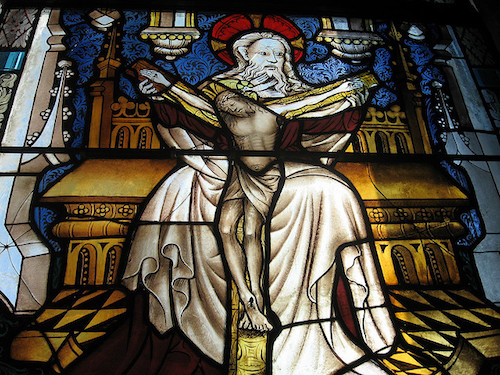We run our website the way we wished the whole internet worked: we provide high quality original content with no ads. We are funded solely by your direct support. Please consider supporting this project.

Did the Father Suffer on the Cross?
When I argue that the cross is a Trinitarian event (See post), some may suspect that I am espousing Patripassionism, which was a second and third century teaching that held that God the Father suffered on the cross. While this view was often expressed as a form of heretical Modalism, and while the Patristic fathers were right in denouncing this, I nevertheless concur with Moltmann, Jungel and others who hold that the advocates of Patripassionism were at least attempting to express an important truth.[1] There is no question but that the distinctness of the Father and Son, as well as the Spirit, must always be maintained. But the distinctness of the three divine Persons is a distinctness of shared love, which is why the triune God is one God. And the true aspect of what ancient advocates of Patripassionism were trying to express is that if the cross reveals the perfect loving character of the one true triune God, it does so only because the experience of the Son on the cross is shared, in their own distinct ways, by the other two members of the triune God. Yes, the Son alone suffered as the one who is afflicted by wicked humans and fallen powers. Yet, the Father suffered as the one who delivered his beloved Son up and the Spirit suffered as the one through whom Jesus offered up his Spirit (Heb 9:14).
Hence, as Moltmann has in particular brilliantly emphasized, the suffering that the Son endured when he experienced separation from the Father and Spirit on the cross was reciprocated by a corresponding suffering of the Father and the Spirit. “In the passion of the Son,” Moltmann writes, “the Father himself suffers the pains of abandonment. In the death of the Son, death comes upon God himself, and the Father suffers the death of his Son in his love for the forsaken man.”[2] And again,
The Son suffers dying, the Father suffers the death of the Son. The grief of the Father here is just as important as the death of the Son. The Fatherlessness of the Son is matched by the Sonlessness of the Father, and if God has constituted himself as the Father of Jesus Christ, then he also suffers the death of his Fatherhood in the death of the Son.[3]
While the distinct way the Son suffers involves suffering in a way we can see, his suffering in fact reveals the suffering of the entire Godhead. And this is simply the quintessential expression of the fact that the distinct way the Son loves reveals the love of the entire Godhead. It is the quintessential expression of the truth that the fullness of the Godhead dwelt in Christ in bodily form (Col 2:9). And it is the quintessential expression of the truth that we “see” and “know” the Father when “see” and “know” Christ (Jn 1:18; 14:7-9) and that the Holy Spirit is the Spirit of Christ (Rom 8).
Hence, while we certainly must never obfuscate the eternal distinctness of the three divine Persons, as modalism does, we also must never separate them, as though the Son could ever experience something that was not shared, in their own distinct ways, by the Father and Spirit.
For this reason, I contend that the love-motivated way Jesus bears the sin of the world, suffering as though he did what he in fact merely allowed, is also shared, in their own distinct ways, by the Father and Spirit. And the fact that the Son took responsibility for all the evil that he as Creator allowed to come to pass in his creation entails that the Father and Spirit, in their own unique ways, also took responsibility for all this evil, though they are no more morally culpable for any of it than is the Son.
The cruciform interpretation of Scripture’s dual way of speaking about God is grounded in this understanding of the Crucifixion as a Trinitarian event. For if the cross reveals what God has always been like, as we have repeatedly argued, it means we must read Scripture with the understanding that God has, out of his covenantal love and fidelity, always been willing to enter into solidarity with sinners and to assume responsibility for all that he allows. And it means that we must read Scripture with our eyes open to other ways we might find expressions of the Father and Spirit sharing in the Son’s identification with sinners and therefore in his taking on the semblance of one who is guilty—that is, as one who had done what he in fact merely allowed.
[1] See Moltmann, The Crucified God, 192, 243-47.
[2] Ibid., 192.
[3] Ibid., 243.
Photo credit: jlwelsh via Visual hunt / CC BY
Category: General
Tags: Cruciform Theology, Love, Trinity
Topics: Attributes and Character
Related Reading

When God Abandoned God
On the cross, Jesus’ cried out, “Eli, Eli, lema sabachthani?” – which means, “My God, my God, why have you forsaken me? (Mt. 27:46). These are arguably the most shocking, beautiful, and profoundly revelatory words found in Scripture. The cry reveals that on Calvary, the all-holy Son of God experienced God-forsakenness as he bore the…

From Good Friday to Easter
This weekend as you contemplate the suffering, death and resurrection of Jesus, we pray that God will reveal his unfathomable love for you in new ways. Blessings to all of you from all of us at ReKnew. Photo credit: Claudio via Visualhunt / CC BY

Podcast: What Does it Mean for Jesus to Mediate for God if Jesus IS God?
Greg discusses what it means for each member of the Trinity to have different roles. http://traffic.libsyn.com/askgregboyd/Episode_0159.mp3

How the Bible is Trustworthy
All of God’s communication in the Scriptures are covenantal in nature. Expressing his covenantal love and faithfulness, God stoops to “breath” Scripture as a means of bearing witness to his covenant relationship with Israel, and then with the Church. Ultimately God “breathed” (2 Tim 3:16) the Scriptures in order to bear witness to the One…

God as Covenant Keeper
Covenant lies at the heart of the biblical understand of God’s relationship to the world. Simply put, a covenant stands in contrast to a contract where parties enter into a quid pro quo arrangement. With a contract an agreement is made to protect oneself. With a covenant, one commits oneself with promises to another for…

Podcast: If Jesus Fully Reveals God, Do We Need the Old Testament?
Greg looks at the value and the role of the Old Testament in light of Jesus’ full revelation of God on the cross. http://traffic.libsyn.com/askgregboyd/Episode_0181.mp3
